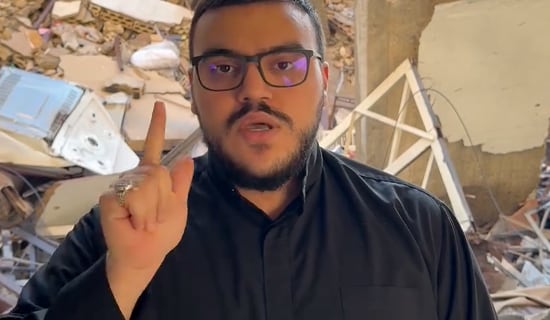
In this rare interview from 2004, Xi Jinping, then Party Secretary of Zhejiang Province, described his early years in Yan'an when he was an "educated youth" from Beijing sent down to the countryside to receive "re-education by the poor peasants". He talked about how he developed the habit of smoking as means to take breaks from hard labor; how his face was splashed with manure when building a biogas digester; and how he once ate raw meat in the countryside.
Interviewer: "Liangjiahe is the place where Xi Jinping, a descendant of an old revolutionary, was sent down to settle as a member of an agricultural production brigade in the countryside. His political career was sentenced to death during the Cultural Revolution, and this child of the 'anti-revolutionary gangsters' back then won the trust of the villagers by his spirit of extra hard work."
Xi Jinping: "Settling in the countryside itself is a stage of defining moments. If we had certain knowledge before the settlement, I always felt that after the settlement, I obtained a sublimation and purification. It was really a sense of reinvention and transformation. After this, if we have gained any insight, if we are becoming mature and successful, if we are familiar with and understand the people, or close to the reality, then it is rooted in this, and acquired from this.
[...]
"On the special train to Yan'an, I remember very clearly that it was January of 1969, and everybody was crying, except for me. I was smiling. At that time, my relatives said to me, 'Why are you still laughing?' I said, 'I would cry if I couldn't leave, because I don't know if I'm going to live or die here. Isn't it a good thing that I'm leaving? Why are you all crying?' Then they stopped the tears and laughed. When I went there, it's true that I was a bit aimless. After I arrived there, I took it as a temporary place to stay, or even as a place to escape. It was so tense in Beijing, the Cultural Revolution was going on so fiercely, so we came here to take refuge, and did not want to integrate into the masses, we weren't used to anything local, and local people were not used to us either.
"Maybe one of the most talked about things about me at that time is that I fed dogs with bread. It was a misunderstanding at the beginning in Yanchuan. It didn't mean that we were wasteful. The bread was stored too long, and it wasn't fresh anymore. When I was cleaning up my schoolbag, there was a half of the bread left. Later, I took it and fed it to the dog at the door. The local folks saw it and asked what it was. I said it was bread. They had never eaten it or seen it. Well, that's how the gossip got started and soon the whole Yanchuan County knew that there was this educated youth or someone who fed bread to dogs, and how awful these youngsters were. And then, because I went there aimlessly, and relatively free and loose, so basically, I did not care much about orders. When I first got there, I didn't go to work, log in, or do any labor at all. Other students obeyed the rules to go, I didn't. Once we climbed a mountain, I was tired and panting, I didn't do any work. I went up the mountain, I said this was as exhausting as climbing peak Guijianchou of Fragrant Hills in Beijing! It was so tiring, when I climbed up here, I already fulfilled my goal, now I had to work? I was just the beginning. I was shocked to see that kind of labor intensity. There was one break between breakfast and lunch, when you could puff some smoke. Of course, there was this unwritten rule that said, if your smoking urge kicked in, you could sit aside and smoke. So, you could even say that was how we learned smoking, because we always wanted to go on lazy breaks. We called for smoking time during workday, 'let's take a break and smoke,' or we said we were going potty. We were looking for excuses to take breaks.
"How could you stand it? We formed a row of hoeing, there was no time to rest. It was hard for us to get used to. And then there was the feeling toward the masses. When we got there, the villagers would sit on out beatable brick bed [kang], which made us feel very uncomfortable. How could they sit on our Kang? Did they carry any lice? There was another thing, which was called dogmatism at that time. Say we had a room of students, the villagers came in, we started to chat: 'We haven't asked one of the most important things yet – what's your class background?' 'Poor and lower middle peasants? Great! Please have some cigarettes.' Suddenly someone who was asked said he was a rich farmer. 'Rich farmer? Get out!' He was shoved out of the room. When we saw someone begging for food, we told them to get lost too. Finally, the local people said: 'These students are cruel, they are mean to people.' Of course, we said that they were wrong, these people were rich farmers. If we were nice to them, weren't we then treating the masses badly? Very dogmatic, we really hadn't seen the real world yet. Later, local people said that that person wasn't much of a rich farmer at all, he was just a 'rich farmer of sheep,' which meant he kept dozens of sheep and was later classified as a 'rich farmer.' As for those beggars, whom we all regarded as hoboes, the locals said that we were wrong again. They said every family over there begged for food to make a living. There was a local saying, 'Rich in January, poor in February, half alive in March and April,' when they left the grain for the laborers, then the wives and children all went out to beg. We only learned about this situation later. There was such a big contrast before. I stayed there for less than half a year, and then I went back to Beijing three months later."
[...]
Interviewer: "Unexpectedly, Beijing was in a tense situation at that time, and Xi Jinping was once again detained as 'backflow population,' which lasted half a year. When he was released again, he was all on his own. This time, there was only one road in front of him – back to Yan'an."
Xi Jinping: "I took it seriously this time. It was really re-education by the poor peasants this time around, trying to blend in with them, get close to them and understand them. And objectively I had to rely on them, because at that time all the educated youth in the village were gone. So, I later said that I had to pass five hurdles. The first hurdle was the fleas. It was very interesting actually. When I first got there, what I could not stand the most was the fleas, I don't know if they still have them over there now, but my skin was very allergic, one flea bite would lead toa large patch of swollen bumps, and eventually those bumps would turn into blisters. When those blisters went rotten, it was so painful that I wanted to kill myself. But three years later, my skin became as thick as beef and horsehide, and I wasn't bothered by those flea bites anymore. The second hurdle was the diet. As I said, I couldn't eat anything and there was nothing I wanted to eat. Those grain and bran...they were not grain and bran anymore, 'bran and vegetables for half a year.' Slowly we learned to eat everything. You had to, because there was nothing to eat. Eventually we became fond of the food villagers brought over. This family brought us a corn cake, that family sent some sorghum rice balls. We enjoyed them. Pickled cabbage became my favorite delicacy. I still miss that pickled cabbage even now. We used to have no meat for a few months. When we saw some meat, we cut a slice, my classmate and I could not help but eat it raw. We lived through those experiences.
"The third hurdle is life skills. We didn't know how to make anything, and we had to rely on others for everything. Later we had to learn everything slowly. We learned to twist wool, but I still couldn't knit socks, those wool socks. But I could sew clothes and quilts, I did all these things myself. All of those things in life were done by ourselves, so it was very beneficial, and to this day our ability to take of ourselves is very strong, and that's where the foundation came from. The fourth hurdle is the labor. I mentioned that by the time I reached the top of the mountain, I was already out of breath. Later, we were given six points for our labor. What did six points mean? A 15- or 16-year-old girl, who was barely old enough to work as a laborer, was able to earn the same points we did, who were about the same age. We felt it was a kind of discrimination, but in fact, we were simply no good. But after one year, I was working day and night, rain or shine. We would cut hay in cave houses and livestock stables. We learned to do more things one by one. Of course, I probably mastered all these skills after one year, gained enough physical strength, and later earned ten points. I was the strongest among the '10-point' earners. For example, we used to carry wheat, up to 200 jin, in the summer. I could walk ten li of mountain road without a break carrying those. This is the fourth hurdle.
"The fifth hurdle, I think, is the thoughts. At first, I felt so out of place. When we first got there, looking at our cave houses in the middle of the mountain with blinking kerosene lamps, you know what I said to my classmates? I said, 'Do you guys feel like Upper Cavemen?' That was very inappropriate to say. But then it was in this environment that we lived for seven years. We went from being afraid of villagers sitting on our kang to asking them to sleep with me. I had four or five young men in my cave house with me. In the evening, when dinner time was over, not only they, but other people from the village came to my cave one after another, to listen to me talk about the past and present. Because I had many stories, they just asked me this or that. 'What was Beijing like?' They knew there were foreign countries, 'What's going on in the U.S.?' Very curious. 'What did you all eat? What did you eat in Beijing? What tastes the best? What other rare stuff have you seen? What are Three Kingdoms, The Water Margin, and Dream of Red Mansions [Chinese classic novels] about?' Later, I told them about the Three Kingdoms, The Water Margin, and the Dream of the Red Mansions, we became good friends with everyone."
[...]
Interviewer: "Two years later, at the strong request of the villagers, the commune asked the county Party Committee to approve Xi's application to join the Communist Party based on exceptional merit. At age 20, Xi Jinping took up the major responsibility of Party Secretary of the Liangjiahe brigade branch. He threw himself down to lead the community. Day and night, he led villagers to build sediment storage dams, produce biogas, so that Liangjiahe became the first village in Shaanxi Province to achieve biogas production and usage."
[...]
Xi Jinping: "First of all, after I became the Party Secretary of the brigade branch, I always wanted to find an entry point to promote economic development. One day I turned to the people's daily, and there was a news report on the front page saying that biogas had been utilized in many places in the Sichuan Province. I got very excited. I thought biogas was a good thing. It was the first time I saw a report on this. So, the idea came to me that in order to solve the problem of coal and firewood shortage in Liangjiahe, we need to develop biogas. The first digester took a lot of effort. I kept seeing that water level on both sides of the biogas digester rising, but no biogas came out. It was very strange. What's going on? Finally, we found the cause of the problem. The airway in the conductor tube was blocked. When I finally poked it open, I got manure splashed all over my face. But the gas came roaring up. After we immediately connected the pipes, flames as high as one chi came out of our biogas stove. It was so smothered moments before. I thought the digester might explode if smothered any longer. By the time our biogas digester was opened, other biogas digesters might have been built in a day or two. But we were still the first.
"At that time, it was the first digester in the whole province. Later, it became the first village in the whole province. More than 70% of the households in the whole village used biogas. At that time, I was supervisor everywhere and every day, a branch Party Secretary and a biogas expert, helping to guide this matter, always thinking about it. There are many unforgettable things. For example, the moment of my departure. At that moment, the sweetness and bitterness of the past seven years finally formed the Liangjiahe people's farewell to me. The night before we had a dinner party. The custom in Northern Shaanxi was to kill a sheep. Every family sent representatives here to say goodbye to me. At that time, it was the custom to give farewell notebooks. It was a notebook with a plastic cover, written with blessings inside. I received many notebooks equivalent to one from each family.
"Then on the next day, the day of my departure, I got up late in the morning because I went to bed late the night before. As I pushed the door open, I found the villagers packed outside waiting. But they didn't disturb me, they just waited quietly because I was sleeping inside. I cried at that time. Maybe I cried for the second time after I settled in Yan'an. It was the second time I cried in the past seven years. The first time was when my eldest sister passed away. I was digging an air raid shelter. After receiving the letter, I cried at that time. But people didn't notice it. I found a private place to cry. This time, I was crying in public. That's like 'losing face' in public. I do consider myself a man form Yan'an, because this is a starting point in my life. This is where, when I faced adversity in my life, when I most needed help from every side, the people of Yan'an reached out and gave me a selfless helping hand. I have formed many of my basic ideas and characteristics in Yan'an. So, I take it for granted that I am a man from Yan'an.
[...]
"I have a very happy family. Both my wife and I have our own careers. But we built this family together. I call my wife every day. It's been like this every day for more than ten years of marriage. Although we spend more time apart than together, we contact each other every day. I'm not able to spend enough time taking care of my daughter either, particularly I couldn't help her with her homework and tutor her, but I still care about her growth very much, and they care about me the same way, so I think my family is very harmonious."

















